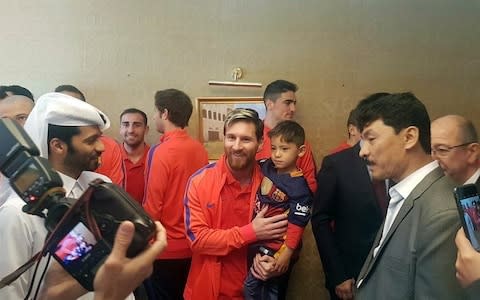Argentina call off controversial World Cup friendly with Israel after campaign targeted at Messi

Argentina has called off their World Cup warm-up match with Israel following pressure from Palestinian football officials and international campaign groups.
The friendly had been planned for Saturday in the contested city of Jerusalem, but the team announced they would not be taking part.
The sold-out game was opposed by Palestinians, who claim the eastern part of the city, annexed by Israel, as the capital of their future state.
However, the Israeli embassy in Argentina blamed what it called "threats and provocations" against Barcelona superstar Lionel Messi.
Jibril Rajoub, head of the Palestinian football association, had encouraged fans to burn shirts bearing Messi's name if he decided to play.
He said on Wednesday that the decision was a "red card from everyone to the Israelis".
Messi has previously expressed support for the Palestinian cause. During the 2014 conflict, the UNICEF Goodwill Ambassador shared on his Facebook a picture of an injured Palestinian child and pleaded for the violence to stop.

The Palestinian Football Federation - which had urged Messi specifically not to take part - welcomed the scrapping of the game, insisting sport should not "be a tool for politicians and for political extortion".
The decision comes weeks after Israeli forces shot dead at least 60 Palestinians protested on the Israel-Gaza border.
"In the end, they've done right thing, and this is behind us," Argentina striker Gonzalo Higuain told ESPN. "Health and common sense come first. We felt that it wasn't right to go."
Miri Regev, Israel's culture minister, accused the Palestinians of terrorism, and evoked the massacre of Israeli Olympians at Munich in 1972 as a comparison.
Prime Minister Benjamin Netanyahu had called Argentine President Mauricio Macri and urged him to intervene, to no avail.
"It's unfortunate the soccer knights of Argentina did not withstand the pressure of the Israeli-hating inciters, whose only goal is to harm our basic right to self-defense and bring about the destruction of Israel," said Defense Minister Avigdor Lieberman.
"We will not yield before a pack of anti-Semitic terrorist supporters,"
Israeli President Reuven Rivlin said it was a sad morning for Israeli sports fans, including his own grandchildren. "But there are values that are greater than even Messi. The politicisation of the Argentinean move worries me greatly," he said.
About | The two-state solution
Opposition figures, however, accused Israel's headline-seeking sports minister of bringing on the politicisation of the sporting event by insisting on moving the game from Haifa to contested Jerusalem and by trying to orchestrate a photo-op with Messi.
Israel captured east Jerusalem, in the 1967 Mideast war and annexed the area in a move that is not internationally recognised. Israel considers the entire city to be its capital, while the Palestinians seek east Jerusalem as the capital of a future state.
Israel has largely fended off the boycott campaign, with only a small number of artists and organisations shunning the country. Argentina's snubbing would appear to be the boycott movement's greatest achievement thus far.
The grassroots movement advocates boycotts, divestment and sanctions against Israel in what supporters say is a way to promote Palestinian rights through nonviolent means.
Israel says the campaign goes beyond Israeli occupation of lands claimed by the Palestinians and masks a deeper aim of delegitimizing or even destroying the country. It has formed a government ministry whose primary mission is to combat the boycott movement.
Argentina opens its Group D campaign in Russia against Iceland on June 16. They then plays Croatia on June 21 and Nigeria on June 26. It is unclear whether Argentina will play another warmup, or if it will arrive to Moscow ahead of schedule.
World Cup 2018 | The best of the Telegraph's coverage
WorldCup - newsletter promo - end of article

